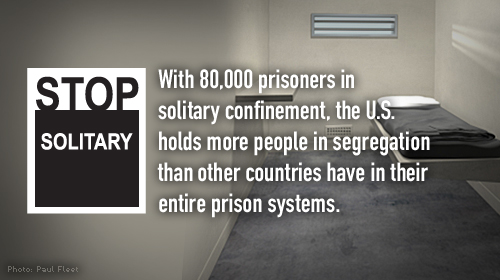
After a mere seven days in solitary confinement, a person's brain activity slows significantly. Every study conducted on the effects of sixty days or more in solitary has found evidence of negative psychological effects. And according to Juan Mendez, the UN Special Rapporteur on Torture, solitary confinement for longer than .
No one, anywhere, should be in solitary for more than 15 days. So why don't we have stronger international standards that set clear boundaries on the use of long-term solitary confinement?
Part of the problem is that the United Nations Standard Minimum Rules for the Treatment of Prisoners (SMRs) do not include sufficient protections against lengthy solitary confinement. Thankfully, a process is currently underway to revise the SMRs to better address human rights issues that have come to the fore since the mid-20th century, such as the rights of LGBT persons and persons with disabilities.
The SMRs, established in 1955, are the leading international standards on protecting the human rights of prisoners. Their influence has reached the lawmaking processes of many countries, and they have been cited by the U.S. Supreme Court. And yet, without sufficient protections against long-term solitary confinement, the SMRs are due for an update. The is an important opportunity to strengthen the SMRs and reinforce the universal prohibition against torture and cruel, inhuman, or degrading treatment of incarcerated persons.
The ACLU has proposed an amendment to the SMRs that would require that solitary confinement never be imposed for longer than 30 days, and only as a measure of last resort to prevent death, serious bodily injury, or a major breach of prison security. We also have proposed a categorical ban on the solitary confinement of juveniles, pregnant women, women with infants and breastfeeding mothers, as well as persons with mental illness.
With the highest incarceration rate in the world, and with an estimated 80,000 prisoners currently held in solitary confinement or other form of highly restricted confinement, the U.S. should take a leadership role in shaping and complying with minimum international standards on the treatment of people behind bars.
Despite the overwhelming evidence that solitary confinement can cause severe, even permanent damage to mental activity and to a person's psychological and social abilities, U.S. prisons continue to use the practice indiscriminately. Federal, state, and local prisons and jails, as well as immigration detention centers and even juvenile facilities, have near-total discretion to use solitary confinement for any reason, and for however long, they choose.
The U.S. routinely holds people in solitary for much longer periods than other countries. A few weeks ago, Herman Wallace passed away after spending more than 41 years in solitary in a Louisiana prison. Compare this with , where stints in solitary have lasted just over two months. Or, where an individual sentenced for "unlawfully supplying State secrets or intelligence to entities outside China" was allegedly held in solitary confinement for two years of her eight-year sentence.
At , the U.N. Special Rapporteur on Torture will hold a discussion the ongoing process of updating the SMRs, with a focus on improving the SMRs so that they will more effectively prevent the torture and ill-treatment of prisoners as proposed in . The goal of the event is to inform UN member states, civil society and individuals about the ongoing targeted review process, and to motivate governments to participate in an upcoming U.N. Expert Group meeting in Brazil, in December. The ACLU is co-sponsoring and speaking at the event.
Updated SMRs are a vital step in the campaign to stop the use of long-term solitary confinement and create more robust protections and oversight against abuse.
Tune into the live webcast of the event on Tuesday at 4:00pm EST here: . And Tweet @UNODC @StateDept to let them know you support banning #solitaryconfinement longer than 15 days.
Learn more about solitary confinement and other civil liberty issues: Sign up for breaking news alerts, , and .
